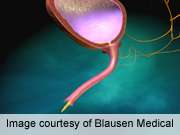Urodynamic studies affect diagnoses, but not treatment

(HealthDay)—Although preoperative urodynamic studies frequently change clinical diagnoses, they rarely lead to changes in the surgical or global treatment plans for women with stress urinary incontinence (UI), according to research published in the January issue of The Journal of Urology.
To examine the effect of preoperative urodynamic studies on global treatment plans, Larry T. Sirls, M.D., of the William Beaumont Hospital in Royal Oak, Mich., and colleagues conducted a secondary analysis of data from a randomized trial involving 294 women with uncomplicated stress UI who were randomized to preoperative urodynamic studies.
The researchers found that, in 56.8 percent of women, urodynamic studies changed the office evaluation diagnoses, significantly reducing the diagnoses of overactive bladder-wet, overactive bladder-dry, and intrinsic sphincter deficiency, and significantly increasing the diagnosis of voiding dysfunction. After urodynamic studies, surgery was cancelled for 1.4 percent of women, the incontinence procedure was changed for 4.4 percent, and plans were made to modify the mid urethral sling tension in 6.8 percent of women. For 14 percent of women, nonoperative treatment plans were changed. Treatment plan changes were not linked to treatment success (odds ratio, 0.96; P = 0.92) but did correlate with significantly increased postoperative treatment for urge UI (odds ratio, 3.23).
"Urodynamic studies significantly changed clinical diagnoses but infrequently changed the global treatment plan or influenced surgeon decision to cancel, change or modify surgical plans," the authors write. "Global treatment plan changes were associated with increased treatment for postoperative urgency urinary incontinence."
Several authors disclosed financial ties to the pharmaceutical industry.
More information:
Abstract
Full Text
Copyright © 2012 HealthDay. All rights reserved.


















